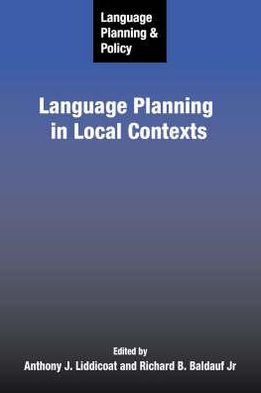

 |

|

The average rating for Language Planning and Policy: Language Planning in Local Contexts based on 2 reviews is 3 stars.
Review # 1 was written on 2009-08-13 00:00:00 Brandy Cook Brandy CookWhat is being creative? For many, the gift of a few geniuses, miraculously inspired and whose exceptional talents serve only purely aesthetical benefits. Well, drawing upon CANCODE (Cambridge And Nottingham Corpus of Discourses in English) a massive computerised source of data containing several millions of utterances in British English and recorded in various contexts, the linguist Ronald Carter brushes aside this post-Romantic vision of creativity to demonstrate that, it is in fact a feature of us all that serves deeply socio-cultural purposes, beyond the mere pleasure it procures. The millions of conversations provided by CANCODE show we are indeed delivering performances after performances every time we are conversing. From the wealth of figures of speech, other numerous plays with languages and, up to certain metalinguistic characteristics the author insists: we do not only use language, we create and re-create it constantly. Creativity is therefore not the sole feature of isolated individuals serving solely artistic purposes only but, also, a sociocultural fact inherent to us all. Far from devaluing the creativity of artists whose works survived the test of time -to become part of a canon, for instance (not everything worth the same!)- Ronald Carter on the contrary invites us here to recognise and evaluate to its just value creativity as its expresses itself in our everyday interactions, yet considered dull and devoid of interest. Such an approach does more than enlightening with a new perspective our conversations. It also opens new paths in all the fields concerned by creativity per se -from psychology to art and literature. Sure, this is a difficult book! It's loaded with linguistic terminology and not quite engaging, but for whose willing to digest it (200 pages are not that bad!) it interestingly (and convincingly!) smashes into pieces a whole idea surrounding the act of creating, both in its scope and its purposes. Beyond its academic rigour, here's therefore a must read for anyone baffled by the notion of creativity. |
Review # 2 was written on 2012-06-11 00:00:00 Eric Prendergast Eric PrendergastRonald Carter's publication, 'Language and Creativity: The Art of Common Talk' is an attempt to build on existing theories of creativity in order to examine whether language can be a creative phenomenon in everyday conversation, or specifically reserved for the solitary literary genius. It asks questions such as whether we create language ourselves or simply build upon existing idioms within the general mass populace, bringing about an argument as to whether anyone can create linguistic creativity, either with conscious effort or via literary devices. The book itself is in actuality the first set-text for the Open University Level 3 module 'E301: The Art of English', which explores the English language as a creative phenomenon in both spoken and written interaction. I chose to take this module as an optional course in order to complete a BA in Humanities with English Language, and this book certainly aids in helping to understand what the OU's course materials attempt to teach its students. In fact, Ronald Carter himself provides a few articles and chapters to the E301 module, so this first set-text is an excellent addition to what is an already interesting academic journey. Published by Routledge in 2004, it can be said that the examples that Carter provides are a bit dated, especially since, in 2014, we are steadily entering into a greater technological age with smartphones, and computer tablets, for example. (This goes for the course itself I would say.) However, Carter's utilisation of the Cancode database and heavy focus on other such linguistic corpora illustrates just how he attempts to explore everyday language as creative in its ubiquitous presence. Splitting his publication into three parts of 'Backgrounds and Theories', 'Forms and Functions' and 'Contexts and Variations', Carter outlines examples and explorations of spoken discourse taken from the Cancode database across six chapters altogether. He focuses on the clines and continua of linguistic creativity, with background exploration of theories from fellow linguists and scholars, in order to examine how our everyday speech can be seen as a creative act, using viewpoints from various cultures and time periods. I would say that 'The Art of Common Talk' is definitely not intended for light reading; far from it. The E301 course team gives its students two weeks to read this set-text, and I found it extremely difficult to follow for the first few days. However, once I got into Carter's format and began to understand his terminology better, I became enthralled with the idea that language can have the power for fictional worlds to be created on a daily basis, via our creative methods of language usage. We ultimately have power over our spoken interaction, which can be either intertextually influenced or created via interdiscursive methods. If you are an aspiring linguist and decide to pick up this book as some exploration of the art of spoken discourse, please be patient and take your time in coming to grips with Carter's own specific methodology regarding his subject matter. I would give the same advice to Open University E301 students, and I would also advise that you work with your tutor and fellow students in examining Carter's viewpoints from a critical perspective, especially since it is more than likely that the OU will expect at least some reference to this material when submitting your tutor-marked assignments online. |
CAN'T FIND WHAT YOU'RE LOOKING FOR? CLICK HERE!!!